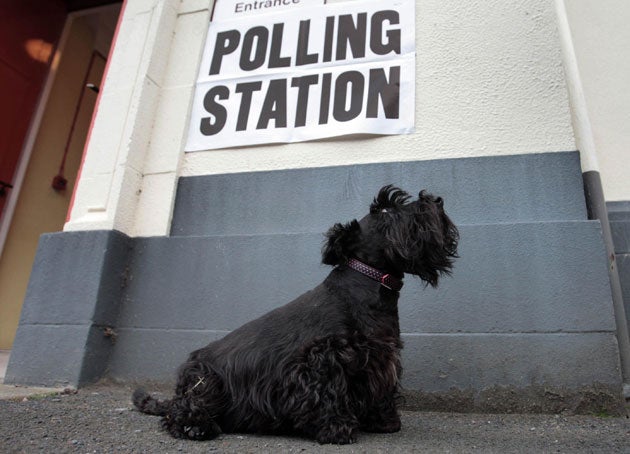The perplexed voters' guide to the weird world of constitutional reform
Gordon Brown has opened a can of political worms with his plans. John Rentoul examines the slippery contents

Gordon Brown's statement on "constitutional renewal" last week opened a Pandora's can of worms. It consisted of a list of proposals, the most important being the independent statutory regulation of MPs' expenses, plus reform of Commons procedure and some changes to the freedom of information law. The remaining five points, all open for "consultation", were: completing reform of the House of Lords; a written constitution; further devolution to Scotland, Wales and within England; electoral reform; and a cut to the minimum voting age. So what might it all amount to?
National Council for Democratic Renewal
David Cameron said it "sounds like something out of North Korea". Brown set it up to consider wider constitutional changes and it met for the first time last Tuesday. As Cameron also noted: "It is not some outward-looking convention that is open to the public. It is not even cross-party. It is just a bunch of ministers talking to themselves."
The D'Hondt method
A 19th century form of contraception invented by Victor D'Hondt, a Belgian lawyer and mathematician. It works by replacing all libidinous urges with the need to add one to the divisor and reallocate the remainder. Has a number of undesirable side effects, however, such as allowing the election of British National Party candidates to the European Parliament.
The Ghost of Woy
Brown got a little cross when Cameron suggested that the BNP wins made the case against electoral reform. The PM cited the report by Roy Jenkins that Tony Blair shelved 11 years ago: "The Jenkins proposals, for the Additional Vote plus PR, laid down criteria by which it would be impossible for the British National Party to hold a seat – even under the PR system – in the British Parliament, unless it won a constituency seat."
AV, AV+, AMS
It is to Brown's credit that even he gets the systems mixed up. He meant the Alternative Vote Plus (AV+), which is what Jenkins recommended. AV simply means voting in single-member constituencies as at present but using numbers rather than an X to rank candidates in order of preference. The Plus bit refers to added members elected for larger regions to make party representation more proportional, as in the Scottish Parliament. The Jenkins plan was therefore AV "plus" the Added Member System, or AMS.
SV, STV
The Supplementary Vote (SV) allows voters only two preferences – both expressed by Xs – in different columns on the ballot paper. Nobody likes it, because it is neither one thing nor the other, which is why it is used in London mayoral elections. All the spods, geeks and nerds who have spent too long thinking about it end up supporting the Single Transferable Vote (STV) in multi-member constituencies. It is the best intellectual compromise between voter choice and proportionality, and it's complete rubbish in practical terms. Look at Ireland: clean politics? Engaged citizenry?
Freedom of Information
Under cover of the review of official secrecy carried out by – an elaborate postmodern joke – Paul Dacre, editor of the Daily Mail, Brown intends to restrict freedom of information. The 30-year rule will be cut to 20, but Cabinet papers are to be excluded in order to spare ministers the embarrassment of having to veto disclosure.
House of Lords reform
This just is not going to happen until most people agree what the Upper House is for. It was easy to be against the hereditary principle, but it turned out that Blair wasn't in favour of a democratic principle in its place. Brown says he is, but has just used the Other Place to draft another batch of unelected ministers into his Government.
Written constitution
Of course the British constitution is written down, but in different places, and it is governed by precedent and is flexible. To draw up a single document enforceable in the Supreme Court that starts to sit separately from the House of Lords this October is a big task. But Brown does not get to whom such a document should belong: "The drafting of such a constitution should ultimately be a matter for the widest possible consultation with the British people themselves."
Votes at 16
A hobby horse of two of Brown's acolytes, Harriet Harman and Ed Miliband – in the latter case because he would like to be entitled to vote at the next election. But this is not popular among MPs generally. Barry Sheerman, chairman of the children's select committee, heckled Harman in the Commons last week, shouting "ridiculous" and "stupid". Brown himself is patently unenthusiastic. As Cameron noted: "He read it so quickly that I am not sure he convinced even himself."
Whip crack away
Brown's best comic line, delivered deadpan, was his suggestion for modernising the procedures of the Commons and cutting the power of the whips, "including making select committee processes more democratic, scheduling more and better time for non-Government business in the House, and enabling the public to initiate directly some issues for debate". Unfortunately, at that point proceedings were interrupted by a flock of large, pink flying mammals.
Newsweek pages 47-48 Alan Watkins page 45
Join our commenting forum
Join thought-provoking conversations, follow other Independent readers and see their replies
Comments